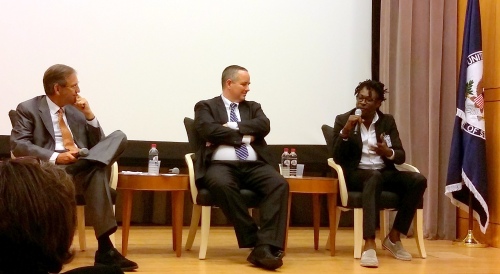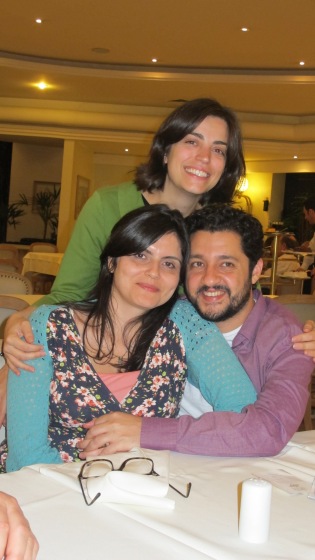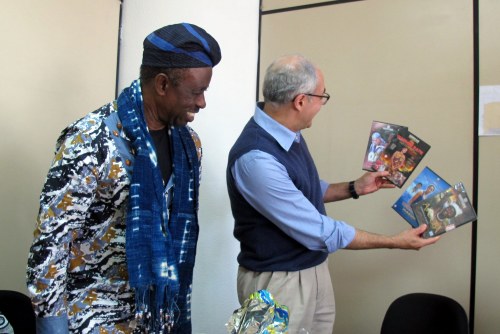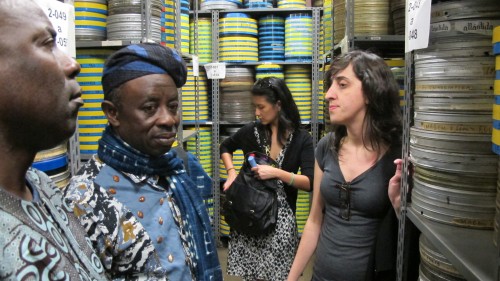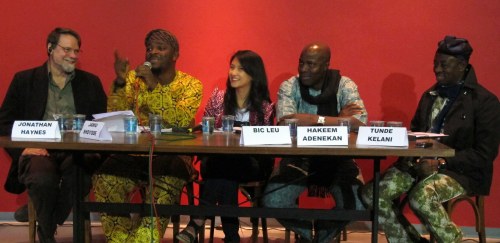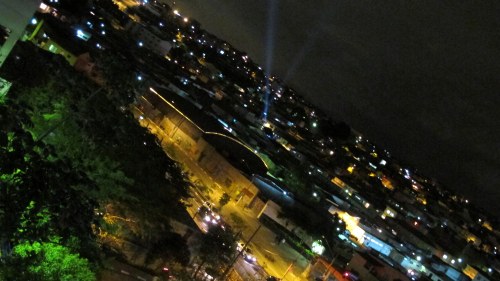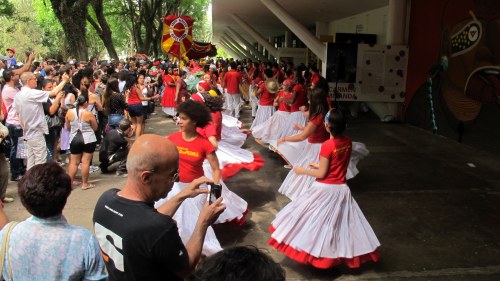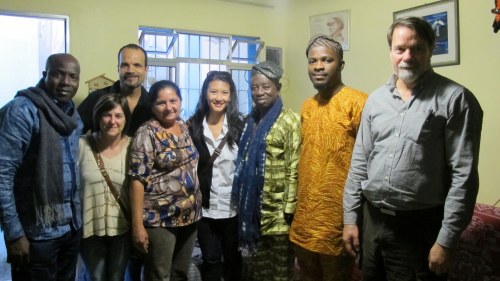Nollywood fever has finally hit The New York Times Magazine. The odyssey began in March 2011 when Andrew Rice, the reporter, contacted me through this blog to gather preliminary research for the article. I was happy to host him for his subsequent research trip to Lagos in July/August 2011, during which I introduced him to director Kunle Afolayan – who became the protagonist in the article. After almost a year, the finished product has been published (I’m also quoted in the piece).
This is the kind of in-depth journalism that Nollywood deserves on the global stage. (The article clocks in at over 4,500 words, which makes it longer any other news coverage on the subject, ever). At this point in its history, discourse about the industry needs to be more sophisticated than glorifying it as a low-cost novelty in guerilla filmmaking. Rice elevates the industry by comparing its origins to that of Hollywood, and thus establishes Nollywood as a world cinema culture. Unlike The Economist, Rice goes beyond macro-level analysis by using Afolayan to portray the current trends in production, distribution and infrastructure.

Kunle Afolayan. © 2012 Andrea Frazzetta for The New York Times
By: Andrew Rice
Published: February 23, 2012
Kunle Afolayan wants to scare you, he wants to thrill you, he wants to make you laugh, but most of all, he would like you to suspend your disbelief — in his plots, yes, which tend to be over the top, but also about what is possible in Africa. He bristles if you call him an “African filmmaker” — a phrase redolent of art-house cinema, which his work assuredly is not. He wants to make huge, explosive, American-style blockbusters, and he wants to make them where he lives — in Nigeria. His ambitions may sound implausible. Nigeria lacks even a reliable supply of electricity. But it does contain a chaotic creative energy that has made it the world’s most prolific producer of films.
Twenty years after bursting from the grungy street markets of Lagos, the $500 million Nigerian movie business churns out more than a thousand titles a year on average, and trails only Hollywood and Bollywood in terms of revenues. The films are hastily shot and then burned onto video CDs, a cheap alternative to DVDs. They are seldom seen in the developed world, but all over Africa consumers snap up the latest releases from video peddlers for a dollar or two. And so while Afolayan’s name is unknown outside Africa, at home, the actor-director is one of the most famous faces in the exploding entertainment scene known — inevitably — as “Nollywood.”
On a continent where economies usually depend on extracting natural resources or on charity, moviemaking is now one of Nigeria’s largest sources of private-sector employment. Walls around Lagos are plastered with posters reading, “Actors/Actresses Wanted.” Nollywood stars are everywhere, from billboards to glossy tabloids filled with pictures of red-carpet events. The African Movie Academy Awards, held each year in the oil-rich Niger Delta region, have become a lavish spectacle, drawing visitors like Forest Whitaker and Danny Glover. Nigeria’s president, Goodluck Jonathan, has recruited Nollywood stars to campaign with him, while Afolayan and others have lent prominent support to a protest movement called “Occupy Nigeria.”
And yet most of the movies themselves are awful, marred by slapdash production, melodramatic acting and ludicrous plots. Afolayan, who is 37, is one of a group of upstart directors trying to transcend those rote formulas and low expectations. His breakthrough film, the 2009 thriller “The Figurine,” was an aesthetic leap: while no viewer would confuse it with “Citizen Kane,” to Nigerians it announced the arrival of a swaggering talent keen to upset an immature industry. Unlike most Nollywood fare, “The Figurine” was released in actual theaters, not on cheap discs, playing to packed houses next to Hollywood features. “Many observers,” Jonathan Haynes, a scholar of Nollywood, recently wrote, “have been waiting a long time for this kind of filmmaking, which can take its place in the international arena proudly and on equal terms.”
In contrast to Nollywood’s chiseled leading men, Afolayan is stout, speaks with a laid-back drawl and has a noticeable scar on one side of his face from a car accident. But he has undeniable charisma — a quality his admirers say he inherited from his father, an actor and legendary playboy. One sticky August night, I accompanied Afolayan on a prowl through Lagos, weaving through the metropolis in his monstrous pickup truck. We ended up at an open-air nightclub called King Sized, where heads turned as he made his entrance with a boisterous entourage. In West Africa, a famous presence demands recognition, so the resident highlife band swiftly shifted into an impromptu praise song. “Kunle Afolayan,” the vocalist began to trill, “Kunle Afolayan is here!”
As the singer celebrated his name, Afolayan nonchalantly sipped from a sweaty beer bottle. This was a scripted ritual; the entertainment didn’t come free. The chorus reached a crescendo as Afolayan, dressed in faded jeans and bursting from a sheer white shirt, came forward with a huge stack of Nigerian banknotes. He began to dance, shaking his hips and moving his feet, casting off bills with fluid flicks of his wrist — a tribute Nigerians call “spraying.” A band member crawled around, scooping up cash, while Afolayan delighted in the adulation.
When I visited Lagos, Afolayan was preparing to start shooting his follow-up to “The Figurine.” He told me he hoped to emulate his hero, Mel Gibson, another actor-director from a remote English-speaking land with outsize appetites and ambitions. “It’s sad,” Afolayan said of Gibson’s recent self-destruction. “I love Mel and I’m such a fan of his work.” He was quick to distance himself from Nollywood and its streetwise art of “guerrilla filmmaking.” “Their mind-set,” Afolayan said, “is totally different than mine.”
For all of Afolayan’s grandiose talk, however, the economic realities of African filmmaking conspire against an improvement in quality. The consumer base is huge — there are more than a billion Africans, 155 million of them in Nigeria alone. But access to those buyers is controlled by the clannish merchants who congregate on the outskirts of Lagos at the Alaba International Market, the distribution hub of the African movie business.
To visit Alaba is to catch a glimpse of entertainment in its Hobbesian state, where few laws restrain profiteers, piracy is rampant and all creative calculations yield to the lowest denominator. The market’s cramped concrete stalls are piled high with video CDs packaged in garish paper envelopes. Men pulling carts laden with boxes jostle through unpaved alleyways, passing under flapping banners advertising new releases like “Mama’s Girls” and “Demonic Attack.” Castoff plastic discs, the detritus of digital replication, litter the muddy ground like seashells.
This may not be quite what Jean-Luc Godard had in mind when he recently declared that with digital cameras, “everyone is now an auteur.” But it certainly represents a vision of what the future could hold — and not just for Nigeria — if the practice of making entertainment ceases to be rewarding to professionals. Even as Afolayan tossed off cash for his song, he faced a vexing challenge in making his next film: who was going to pay for his work? When everyone is an auteur, who values artistry?
On a Saturday afternoon, in the last hour of precious daylight, Osita Iheme was ready to work. A dwarf popularly known as Paw Paw, and the star of a string of politically incorrect hits with titles like “Baby Police,” Iheme is one of Nollywood’s most bankable actors. In his latest film, an ensemble comedy set in cramped slum housing, he was playing the lecherous son of a landlord. The director, working with a single Sony digital camera, watched the scene unfold on a beat-up TV monitor. It involved a scatological sight gag, a confrontation with a gaggle of female tenants and lots of screaming. Iheme set his face in an exaggerated glower as the actor playing the landlord wagged his finger and bellowed, “You have turned my place into a market square for madwomen!”
Nollywood’s bawdy humor — or fright or fantasy — appeals to a public seeking escape from depressing living conditions. The industry itself was born out of economic desperation during the early 1990s, a period of military dictatorship, low prices for Nigeria’s oil and Western-mandated “structural adjustment” of its economy. Actors and cameramen were out of work because of budget cuts at the national television station. Movie theaters were closed because no one wanted to venture into the dangerous streets at night. According to legend, the first Nollywood movie was made by a small-time electronics trader named Kenneth Nnebue, who, stuck with a large shipment of blank videotapes, decided to unload them by making a movie about a man who sells his soul for wealth. That movie, “Living in Bondage,” sold hundreds of thousands of copies and established Nollywood’s archetypal plot elements: martial discord, greed, a conflict between Christianity and juju, as the occult is called in West Africa. From these accidental origins, a cultural phenomenon emerged.
Other merchants, overwhelmingly members of Nnebue’s ethnic group, the Igbo, followed him into business. They literally made things up as they went, shooting movies in just a few days, based on vague scenarios instead of scripts. Directors approximated tracking shots by pushing their cameramen around in wheelchairs. Quality was shaky, but the buying public didn’t care. Between 1994 and 2005, production in Nigeria went from a handful of feature movies a year to more than 2,500.
“We watch these Africa films like ‘Blood Diamond’ and ‘The Last King of Scotland’ — they’re always from the perspective of the Europeans,” says Lancelot Oduwa Imasuen, who has directed more than 160 features. He was the subject of a documentary called “Nollywood Babylon,” which was shown at the Sundance Film Festival, and he told me that when he went to the festival, he was shocked to discover that some American directors had been working for years to make just one movie.
Kenneth Nnebue quit Nollywood a few years ago, retiring to his village to devote his life to preaching the Bible. But the industry he established remains tightly controlled by the same group of Igbo businessmen, an insular guild sometimes called the Alaba cartel.
Afolayan’s father, known as Ade Love, was a leading man in the Nigerian film scene of the 1970s, until it was ruined by economic collapse. Up to his death in 1996, he warned his son away from show business, pushing him into a stable career in banking, and although Afolayan eventually went against his father’s wishes, he absorbed the bitter lesson that artistic aspirations mean little without a sustainable business model. As things stand now, moviemakers must sell a huge volume of discs, very quickly, in order to turn a profit. Pirates — taking advantage of the same mass-replication technology that made Nollywood possible in the first place — almost immediately rip off any popular new release. So the black market effectively sets everyone’s prices.
To make the more costly kind of films he envisions, Afolayan has been compelled to devise a strategy that goes around Alaba. “They’re just businesspeople,” Afolayan says dismissively. “They could not really care less about content.” In an evolutionary inversion, his strategy depends on theaters, which have returned to Nigeria along with democracy and the global oil boom. Movie tickets have become a fashionable indulgence for Lagos’s expanding population of prosperous professionals. It is in this privileged world — not the slums — that Afolayan’s movie “The Figurine” takes place. Since its sensational release, people have begun to speak of an emerging movement — New Nollywood — that has captivated a new generation of would-be filmmakers.
My visit coincided with a monthlong program, conducted by the New York Film Academy, that was training 250 Nigerian students in the rudiments of professional technique. I sat in on a shoot for “Awakening,” being made by some earlier graduates of the program, well-educated strivers in their 20s, some of whom had quit good jobs at banks or telecommunications companies to devote themselves to the project. The director, James Omokwe, said that he had seen “The Figurine” twice and wanted to follow its lead into the theaters. “We don’t have the money to finish the movie,” Omokwe added, cheerfully. “But we will definitely do it somehow.”
Many established Nigerian directors are also making big plans for the big screen, with big budgets, and they all seem to have a part for Danny Glover. One night I took a glass elevator up to the Silverbird Cinema, an American-style mall multiplex in a nouveau riche section of Lagos. After paying about $7 — an exorbitant sum in Nigeria — I watched “The Mirror Boy,” a hot New Nollywood release. It was about an African boy, raised in Britain, who returns home and ends up on a long quest through the jungle, accompanied by a ghostly guide, played by Osita Iheme. The production values were far superior to anything I had seen on video, but the movie still climaxed in Nollywood’s customary blaze of sorcery, inspiring one audience member to shout out, “Africa!”
Nollywood movies, both old and new, often play on traditional African beliefs about magic and spirits. “The Figurine” is about two young university graduates — rivals for the same woman’s affections — who stumble on a shrine and uncover the statue of a god. The figurine is supposed to grant seven years of good luck, followed by seven of misfortune. Afolayan’s character brings it home to Lagos, wins the girl and great wealth, at which point the plot takes a horror-genre turn.
“That’s the figurine,” Afolayan said one day at his office, pointing to a carved wooden prop on his shelf. By this point, I was starting to wonder about the fortune it had brought Afolayan. His follow-up film, “Phone Swap,” was supposed to be shooting. But just a few days before, one of its stars, a beloved character actor named Sam Loco Efe, dropped dead while shooting another movie. The newspapers were filled with condolences, as well as speculation that the veteran actor might have been killed by overwork.
“Phone Swap” was supposed to be a humorous and commercially appealing diversion. Instead it was threatening to become a debacle. As usual, Afolayan had to contend with the absence of vital equipment, decent roads, reliable electricity. He had abruptly dropped his leading man for cantankerous behavior. Now came the untimely death of Sam Loco. “I was just so devastated,” Afolayan said, telling me that the day before he had quit work early to curl up and watch romantic comedies.
Afolayan also handles the financial side of his productions, and “Phone Swap” was conceived with an eye toward product placement, though the cellphone company originally involved had backed out. The story involves a pair of opposites, a free-spirited single girl from the country and a serious Lagos businessman who end up enmeshed in each other’s lives after they mix up their phones. The plot was made to appeal to Nigeria’s new elite, for whom the BlackBerry is a totem as powerful as any figurine. Sam Loco was supposed to play the female lead’s father, an Igbo farmer.
One morning, while he considered replacements for Sam Loco, Afolayan assembled his key crew members to scout locations in the town of Badagry, near the Benin border. We left before dawn to avoid Lagos’s paralyzing traffic jams. Badagry sits along a route often used by smugglers, and there were police roadblocks along the way. But Afolayan blew right through them in his big truck, shouting, “Are you crazy?” at one cop who tried to step in front. The town, an old slaving port, was meant to stand in for an Igbo village. From the back seat, the art director Pat Nebo, an Igbo, gave a lecture on the group’s customs and agricultural practices, lots of painstaking talk about palm oil and kola nuts. “Don’t forget this is a comedy film,” Afolayan gently reminded him.
We came to the small concrete house that would serve as the set of the farm. “It’s so dirty,” Afolayan said happily. Everyone walked through its dank main hallway, which smelled of smoke and fish, into a sandy backyard where laundry flapped in the wind. “Fantastic, this is brilliant,” said the cinematographer Yinka Edward, as he began conceptualizing an ambitious crane shot.
“The house becomes a major character of the film,” Nebo pronounced, before heading off to scout for appropriate livestock.
Afolayan’s budget for “Phone Swap,” around $500,000, was tiny by Hollywood standards but Spielberg-size for Nigeria. Before embarking on the project, Afolayan went to potential investors with a 29-page business plan, discussing everything from plot details to the fees for equipment rentals and actors. He managed to entice an investor to pledge $1.5 million, enough to finance his next three films. But as deadlines neared, the money still had not appeared. He handed over his BlackBerry so I could read a series of progressively more frustrated e-mail messages. “Most of these investors, they just think business,” Afolayan said. “They don’t really understand the ethic of production.”
Of course, profit motives drove the development of the medium long before pretensions of artistry. The first American movies were disdained by respectable society, but the price of admission — 5 cents, hence the term “nickelodeon” — made them popular with working-class audiences. One day in 1906, an unemployed clothing merchant named Carl Laemmle, who was thinking about starting a five-and-dime, happened to walk into a packed Chicago nickelodeon. “It was evident that the basic idea of motion pictures and Mr. Woolworth’s innovation were identical,” Laemmle later wrote, “small-price commodity in tremendous quantities.” Laemmle started his own theater, and eventually expanded into producing content, founding Universal Pictures.
The businessmen behind Nollywood have followed a similar path from upstart to mogul. In the absence of strong legal institutions, Nigeria’s movie marketers formed a guild to govern their industry, colluding to regulate supply and production costs. The guild has resisted all attempts by actors and producers to push for a larger share of revenue.
“We created the industry,” Gab Okoye, a marketer who goes by the name Gabosky, proudly said one afternoon. We were standing near the red carpet outside a Lagos banquet hall, where the local chapter of the guild was about to inaugurate new officers. To celebrate and pay homage, all of old Nollywood had turned out in its flashiest finery, lots of bright ankara cloth and dark sunglasses. Gabosky, who was wearing a hip-hop-inspired ensemble, told me he felt disrespected by the new filmmakers like Afolayan. He called them “houseboys” who had forgotten their place. “He’s started complaining about his master,” he said, “who was giving him a job yesterday.”
Inside, the powerful guild president, Emmanuel Isikaku, took the stage. “Nollywood is still alive,” he told the audience. “Nollywood is still great.” The defensive tenor of his declaration was indicative of the marketers’ mood. They had built an entertainment enterprise without precedent in Africa, and yet they felt unappreciated and besieged. The government was trying to crack down with increased fees and oversight. The event’s written program warned of the calamity of regulation and maligned Nigerian actors as “lazy.” When stars become too demanding, marketers deal with them ruthlessly. A few years ago, they put several prominent actors on a blacklist, and none were allowed to work, according to a guild official, until they begged forgiveness.
The marketers say they can’t afford the extravagances of talent. The production budget for a typical Nollywood movie ranges between $25,000 and $50,000, less than a tenth of what Afolayan was proposing for “Phone Swap.” The marketers contend that spending more would be foolish, because the low price of Nollywood movies is part of their appeal. “You must first identify who your primary market is,” Isikaku, a shrewd and sinewy operator, told me. “If your primary audience is the elites and the middle class, the people that can go to the cinema, fine, well and good. But there are some programs that are meant for the people on the street.”
Richmond Ezihe, the guild boss at Alaba market, tried to explain Nollywood economics to me. We met one afternoon in front of the stall that serves as the base for his company. Pasted to its metal door was a poster for a recent feature, “Palace of Blood.” When Ezihe, who is the financier and executive producer, comes up with the concept for a movie, he gives it to a couple of screenwriters he keeps on retainer and then hires a director to hurriedly shoot, having the film ready for sale on the Alaba market within a month or two.
Ezihe has a number of ways to monetize his product: there’s a satellite television station, an overseas DVD market catering to the African diaspora and even a Netflix-inspired Web site called Nollywood Love. But most revenues still come from physical sales. It costs less than 20 cents to burn a blank VCD and package it, but the wholesale price for movies is so cheap that a marketer might need to sell 100,000 copies just to make a decent return. The average Nollywood movie has a shelf life of about two weeks before the pirates get hold of it. In Nigeria, an estimated 5 to 10 illegal VCDs are sold for every legitimate one, and the police make no serious effort to deter the trade.
“It really has eaten deep into our finances,” Ezihe said, claiming — as did every other marketer I met — to be mystified about the identity of the troublesome scofflaws. “They’re hiding,” he said. In fact, clues as to the pirates’ whereabouts were strewed all around Alaba, where American movies and TV series, rap music and video games of doubtful provenance were selling next to the latest Nollywood hits. Many of the movie marketers originally got into the business by pirating Hollywood movies, a practice that continues to flourish. “Piracy is not a problem with the system,” said Jade Miller, an academic at Tulane University who has researched Nollywood’s economics. “It is the system, essentially.”
The legal and illegal industries continue to operate in parallel, within an opaque system of relationships and rules set by the Alaba cartel, Emeka Mba, head of Nigeria’s efforts to regulate the film industry, told me. “The pirates, they know them — it’s part of them,” he said. The marketers seldom use lawyers, accountants or written contracts; when they make a film, it is often unclear who even holds the copyright. When Mba’s agency tried to impose some legal order, for instance mandating that marketers register under a postal address, he met brutal resistance. Anti-piracy raids, though rare, have sparked violent uprisings at Alaba.
Isikaku did not deny that there were pirates in his membership’s midst, but he claimed that guild leaders were trying to confront them, sometimes physically, sometimes with persuasion. But the reality is that when everyone is stealing, you have to price like a pirate.
Carl Laemmle might have recognized the marketers’ situation. When he started Universal, he immediately came into conflict with Thomas Edison, who held patents on movie cameras and projectors. Edison had been waging a legal battle against “dupers,” unauthorized copyists who would take a film and redistribute it, often just snipping off the copyright frames. As Edison saw it, his intellectual property rights gave him a monopoly on all film production. He went after Laemmle, too, filing some 289 lawsuits against him and dispatching goons to break up his film shoots.
Laemmle responded by organizing some other “independents,” a handful of mostly Jewish movie producers who operated out of New York. In 1917, they defeated Edison in the Supreme Court. But by that time the independents had already moved en masse out to California, where they could shoot in sunny weather, away from the chill of legal scrutiny. “They were pirates!” says Bic Leu, a Fulbright fellow who has studied Nollywood. “They moved to L.A. to get away from Thomas Edison.”
One evening at a hotel bar, I happened to run into a Nigerian-born actor named Wale Ojo. We got to talking, and he said that after scraping by for years in London, he returned to try his luck back home. A few days thereafter, in a true Nollywood twist, I met Ojo a second time, when Afolayan introduced him to me as the new lead actor in “Phone Swap.” Afolayan had us over one Sunday evening to drink wine by his poolside, along with some friends from the industry and a couple of international film buffs.
“Black British actors are cheap right now,” Ojo said.
“Good,” Afolayan replied. “Because I don’t have the money to pay you.”
Afolayan had also come up with an actor to take Sam Loco’s role, so everything was in place for “Phone Swap” — except the financing, which remained frustratingly elusive. The director kept offering self-confident assurances that his backer would come through. But anyone could tell that, all quips aside, he was anxious.
Perversely, the rise of video, which had given Afolayan the ability to practice his father’s craft, had also robbed it of its value. His career represents a possibly rash wager: that even in the most lawless marketplace, talent is still worth a premium. When he started to make “The Figurine,” announcing on Facebook that he planned to spend 50 million naira, roughly $350,000, the universal reaction was incredulity. Afolayan told me: “Everybody started writing, saying, ‘How will you make your money? You want to commit suicide?’ ” To pay for “The Figurine,” Afolayan took out a bank loan for half the budget, pledging his house as collateral, and subsidized another third of the movie through product placement.
“Kunle was out to make a statement, that it was possible to make a good film in this country using local hands,” Yinka Edward said. When he ran out of money at one point, stalling production, Afolayan borrowed from family and friends and asked his cast and crew to keep working on good faith.
His efforts appeared to receive vindication in the box-office performance of “The Figurine.” But the triumphal narrative breaks down when you examine the financials. For all its acclaim, Afolayan said that “The Figurine” had yet to turn a substantial profit. The movie showed to packed houses, but there are just seven major theaters in Nigeria, and it grossed only around $200,000 in its initial release, not enough to cover Afolayan’s investment.
To maximize revenues, Afolayan made a deal with an independent entertainment company that was having encrypted DVDs of “The Figurine” shipped in from China for mass distribution. The executive handling the project told me that his plan was to simultaneously release a huge number of copies across the country, so as not to create scarcity, which encourages piracy. Then he drew a diagram of his network, each strand of which ended with some regional marketer. There was just no way to circumvent the unyielding force of the cartel. Emeka Mba, the government regulator, told me that he saw Afolayan’s efforts to devise a new distribution system as an inspirational experiment. “Here’s a guy who wants to do things differently,” he said. “Here is a guy who is brave.”
After weeks of waiting for his nervous investor, Afolayan called his editor and sidekick, Steve Sodiya, into his office and said he had decided to move forward. “I want to start with my own money,” Afolayan told him. “We have to start the shoot. I’ve been making a backup plan.” It involved some financing from product placement, and a large personal endorsement contract — from a cellphone company. His production company’s office, sleepy for days, was suddenly abuzz with frantic preparation: costumes, casting, equipment rentals. Afolayan spent an afternoon in last-minute negotiations to knock down everyone’s fees. “You think I am not resourceful?” he shouted at one resistant crew member.
In the final week of August, “Phone Swap” finally began shooting in Badagry. Afolayan presided over the shoot from a canvas director’s chair. The week before, local meteorologists warned of an epic rainstorm, but this time luck was with him. One evening, on the shabby farmhouse set, Wale Ojo, who was playing the uncomfortable city slicker, positioned himself for his first scene, and Afolayan shouted, “Action!”
Weeks later, after shooting wrapped, Afolayan e-mailed me a clip of the rushes and informed me that he was “dead broke.” A trailer, featuring a scene in an airplane cabin painstakingly recreated by Pat Nebo, built anticipation when it hit YouTube in November. The movie is scheduled to have its premiere over the next two months in Lagos, Accra and London. Already, though, Afolayan is planning his next film, which he calls a passion project. He told me something about it while I was in Lagos. Sitting in his unlit office one rainy day, he excitedly explained that it would be about a dead man who walks the earth, refusing to admit his condition. He said he hoped to land Danny Glover for a big part. “I’m creating two worlds,” Afolayan told me. “The land of the dead and the land of the living.” It seemed impolite to interrupt to ask when the office’s electricity might return.
Andrew Rice is a contributing writer and the author of “The Teeth May Smile, but the Heart Does Not Forget.”
Editor: Vera Titunik
Read Full Post »
